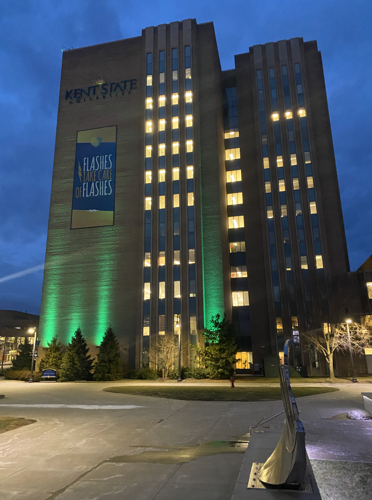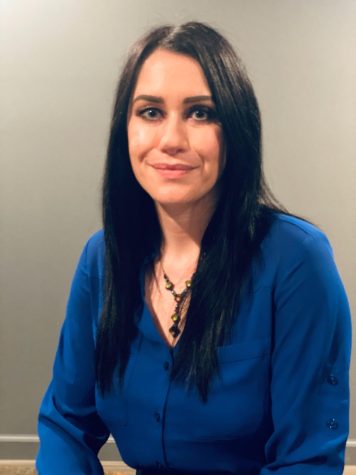Kent State commemorates National Eating Disorder Awareness Week with library light display

The Kent State University Library will be lit in blue and green all National Eating Disorder Awareness Week, from February 21 through February 27.
Editor’s Note: Maddy Haberberger, campus representative for National Eating Disorders Association, serves as the social media manager for The Kent Stater and KentWired. Given her role and relationship to the story, KentWired interviewed her as a source.
The exterior of Kent State’s library shined bright with green and blue lights this week to symbolize the importance of National Eating Disorder Awareness Week.
Inspired by her involvement with the National Eating Disorder Awareness organization, also known as NEDA, through a public relations project, senior journalism major Maddy Haberberger organized the light display from Feb. 21 through Feb. 27 during the entirety of National Eating Disorder Awareness Week.
“They [NEDA] light up different monuments around the country, and I got them to light up the Kent State Library,” she said.
Haberberger, who stepped in as NEDA Kent campus representative following her class project, is one of many who are bringing awareness to the severity of eating disorders.
The term “eating disorder” might still be viewed as taboo in everyday life, but some 8 million U.S. citizens currently suffer with an “ED” of some type.
NEDAwareness Week “is an annual campaign to educate the public about the realities of eating disorders and to provide hope, support, and visibility to individuals and families affected by eating disorders,” according to the National Eating Disorder Awareness website.
According to NEDA’s research, approximately “10% and 20% of women and 4% to 10% of men in college suffer from an eating disorder, and rates are on the rise.”
Tanya Falcone, a registered dietitian and Kent State faculty member, is in charge of the Center for Nutrition Outreach non-profit organization at Kent State, which provides free nutritional counseling to students, faculty and staff alike. This often includes students who are suffering from disordered eating habits or full-on eating disorders, she said.

“We are seeing a lot of disordered eating,” Falcone said. “So like, people who are doing crash diets, starving themselves for days on end and then overeating and having that guilt and trying to achieve that body image.”
Scientifically speaking, eating disorders are the deadliest mental illness to date, and National Eating Disorder Awareness is trying to bring attention to this issue during their week-long ED awareness movement.
The National Eating Disorder Association began the NEDAwareness Week campaign in 2002, with the goal of raising awareness of eating disorders and providing access to treatment for those who might need it.
“NEDA is actually really great,” Falcone said. “They don’t just focus on “Do what makes you happy and eat what you want,” but they’re also focused on mental health.”
The NEDA website provides a screening tool to determine whether an individual, or a loved one, is suffering from an eating disorder, offers information to dieticians across the U.S., as well as a weekly crisis helpline, Falcone said.
“They’re very focused on body positivity and really focusing on health, as well as focusing on our individual bodies,” she said.
As a dietitian, Falcone helps clients make the distinction between disordered eating and an eating disorder. To be specifically diagnosed with an ED, individuals must meet a certain level of factors, and it’s different for anorexia, bulimia and many others.
“[For] someone who has an eating disorder, it consumes them,” Falcone said. “With disordered eating, there’s a bit less of that.”
After all, Falcone said it can also be tough to distinguish between healthy living and bodily obsessions.
“We want people to be physically active, but if you don’t exercise, do you feel guilty? Are you exercising for 3 hours at a time?” she said.
These types of questions can help determine whether someone has an eating disorder or disordered eating issues.
Additionally, there is a common misconception that anorexia nervosa is the only type of ED, but there are plenty of others, as well.
These include bulimia nervosa, diabulimia, avoidant restrictive food intake disorder, other specified feeding and eating disorder, night eating syndrome and pica, which involves eating non-food items such as dirt, grass, or sand.
In terms of overall prevalence, Falcone said “Statistically speaking, we’re looking at anorexia and bulimia being similar.”
According to NEDA’s website, “between 0.3-0.4% of young women and 0.1% of young men will suffer from anorexia nervosa,” while “1.0% of young women and .01% of young men will meet the criteria for bulimia.”
Falcone’s experience with clients isn’t far off from the statistical norms.
“Based on what I’ve seen, in college students who have come to see me, I actually see a lot of what I would refer to as some pretty borderline disordered eating to the point of people wanting to achieve a very unrealistic body that tends to lean towards very skinny, but having that athletic body,” she says.
Part of this obsession with thinness, or with being “thicker,” has to do with social media influencers.
Social media platforms like Instagram and TikTok allow individuals to showcase society’s perception of the “ideal beauty standard” in a way that appeals to a mass audience.
Instead of trying to aim for body positivity of the individual, Falcone said social media users are “focusing so much on a body type that we’re actually moving away from what we’re trying to do.”
She said she believes there should be more of an emphasis on individual self-love and self-care, which is often overlooked online.
For this reason, and many others, Falcone is working hard to help those with EDs and disordered eating to face their issues head on. Falcone provided a word of advice for those who might be dealing with difficult thoughts and obsessions around food.
“I think it’s important to talk to a professional,” she said. “And when I say a professional, I’m talking about an actual licensed counselor or dietician, not just a nutritionist or someone who doesn’t have credentials…”
Falcone herself went through six years of schooling, then a year-long internship program followed by taking the board exams. She’s also hoping to finish additional studies this upcoming summer, which will qualify her with another degree in clinical mental health counseling.
Additionally, NEDAwareness Week is officially recognized by the White House as it continues to encourage individuals to reach out for help.
Due to the growing awareness, NEDA’s messaging encourages individuals to “see the Change, be the Change.”
For more information on NEDAwareness Week, go to https://www.nationaleatingdisorders.org/.
Morgan McGrath is a reporter. Contact her at [email protected].


